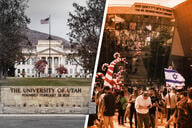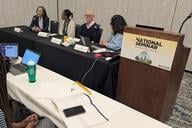You have /5 articles left.
Sign up for a free account or log in.

Presidents Reagan, Bush and Obama at Notre Dame commencements
Getty Images
In 1981, President Reagan's first trip after surviving an assassination attempt was to deliver the commencement address at the University of Notre Dame. In 2009, many anti-abortion activists (largely outside the university) condemned Notre Dame for inviting President Obama to deliver the address, given his support for abortion rights. But he was warmly received and praised the university for being willing to listen to all views. University leaders at the time noted the tradition of inviting presidents, many times in their first years in office.
That tradition may have ended Thursday, when Notre Dame announced that Vice President Mike Pence would be this year's commencement speaker.
The Reverend John I. Jenkins, president of Notre Dame, said shortly after Election Day that he was reconsidering the tradition of inviting new presidents to speak at commencement. “What is the most constructive thing to do?” he said in a November interview. “It’s just something I’m reflecting on now.”
The Notre Dame announcement Thursday mentioned President Trump only in passing, and noted the links between Pence, a former Indiana governor, and Notre Dame, located in Indiana. One quote in the announcement praised Pence for “his own brand of reserved dignity.”
A Notre Dame spokesman declined to say whether Trump had been considered or invited. “Notre Dame only announces commencement speakers who have accepted our offer to speak at commencement. We don’t announce or speculate on who else may or may not have been invited or considered,” said the spokesman via email.
President Eisenhower was the first U.S. chief executive to speak at a Notre Dame commencement. Since then, Notre Dame graduates have been addressed by Presidents Carter, Reagan, Bush (George H. W.), Bush (George W.) and Obama.
The criticism of the invitation to Obama centered on a conflict between his view of abortion rights and that of the Roman Catholic Church. Both Trump and Pence are anti-abortion, and Pence is considered one of the favorite political leaders of the anti-abortion movement.
On other issues, though, the Trump administration has taken positions opposed by Notre Dame and church leaders -- and Father Jenkins has spoken out about these positions, taken during the 2016 campaign and since.
In July, Father Jenkins gave a speech in Mexico in which he criticized anti-immigrant political rhetoric. “The vitriol directed at the Irish … and later the Italians, and other waves of immigrants to the United States, sadly is not a thing of the past, certainly not for Mexicans in the United States who have been slandered in extraordinary ways, as has Mexico itself,” Father Jenkins said. “It is churlish, insulting political theater, for certain. But it is not only that. It suggests that the United States distance itself from Mexico at just the time that our nations are most positively engaged with each other and poised to reap the benefits of robust trade, industrialization and entrepreneurship.”
The July statement did not mention Trump by name. But in January, Father Jenkins did name Trump, in a statement denouncing his ban (since blocked by federal courts) on travel to the United States from seven Muslim-majority nations.
The statement: “The sweeping, indiscriminate and abrupt character of President Trump’s recent executive order halts the work of valued students and colleagues who have already passed a rigorous, post-9/11 review process, are vouched for by the university and have contributed so much to our campuses. If it stands, it will over time diminish the scope and strength of the educational and research efforts of American universities, which have been the source not only of intellectual discovery but of economic innovation for the United States and international understanding for our world; and, above all, it will demean our nation, whose true greatness has been its guiding ideals of fairness, welcome to immigrants, compassion for refugees, respect for religious faith and the courageous refusal to compromise its principles in the face of threats.”
Since the election, op-eds in the student newspaper at Notre Dame have debated whether Trump should be invited. A petition also urged Father Jenkins not to invite Trump.
Shortly after Father Jenkins suggested he might reconsider the tradition of inviting new presidents, Eddie Damstra, a sophomore, published an open letter to the university’s president in The Observer, the student newspaper. In his letter, Damstra said he didn’t vote for Trump, but still thought he should be invited.
“Inviting Trump to speak is not a blanket declaration of tolerance for the offensive remarks he made during his campaign,” Damstra wrote. “Just as inviting President Barack Obama was not a condoning of his positions on abortion, inviting Trump is not declaring agreement with all of the policies he has proposed or statements he has made. Rather, inviting Trump is embracing the virtue of open expression and holding high respect for the executive office of the president.”
Among those who responded was Michael Folger, a member of the class that graduated in 2009 and who heard Obama address graduates. Folger wrote that he had been delighted by the invitation to Obama and had been puzzled at the time that anyone would object. “I found the whole situation baffling. Would Notre Dame seriously decline to invite the president to speak at our graduation? Surely, an invitation to speak at commencement need not equate to an endorsement of all of the president’s policies, and a snub seemed like a close-minded refusal to engage with anyone whose political beliefs did not align with Catholic teaching,” Folger wrote.
As a result, he said he expected to favor that the university invite future presidents, regardless of their views. And while he said he might “seem hypocritical,” Folger wrote that he didn't think Trump should be invited, but that his view was about more than politics.
“Mr. Trump has also done much to divide us, including his comments on immigrants and Muslims, his refusal to distance himself from or forcibly denounce the white supremacist right (the so-called alt-right), his continued refusal to take any responsibility, even indirectly, for pulling us apart. An invitation to speak at commencement might not equate to an endorsement of Mr. Trump’s policies, but it does at least partially endorse Mr. Trump, the man,” Folger wrote. “It would be wrong to decline to invite Mr. Trump because of legitimately held political differences, but it would be worse still to invite Mr. Trump following the concrete actions he has taken that threaten to corrode the foundation of our democracy and rip apart the ties that bind us together.”




